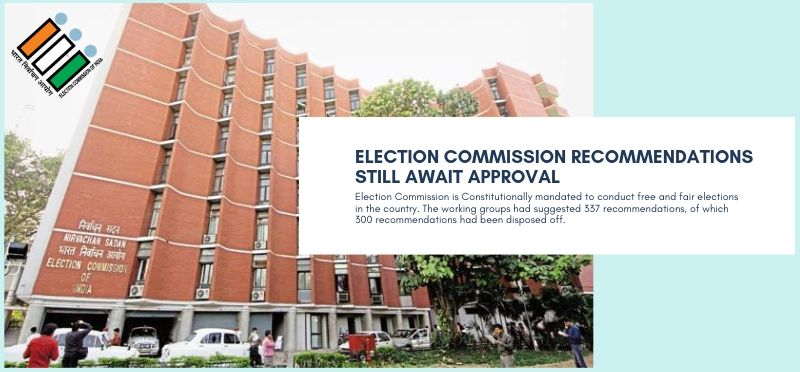
The recommendations of various working groups of the Election Commission are awaiting approval since 2014.
In-Detail :-
- The Election Commission is Constitutionally mandated to conduct free and fair elections in the country.
- With the ever-evolving polity, the Commission needs certain powers to conduct elections free and fair.
- The commission has constituted various working groups to suggest ways to conduct the democratic exercise free and fair based on the experience of 2014 Lok Sabha elections.
- The working groups had suggested 337 recommendations, of which 300 recommendations had been disposed off.
- Of the remaining 37 recommendations, there are some recommendations that can drastically improve the way elections are conducted in India. But, they are yet to be accepted by the government.
The Recommendations :-
- One of the recommendations includes disqualifying a candidate who has been framed for an offence with a minimum of five years punishment. Here the recommendation calls for disqualifying the candidate at framing stage itself rather than waiting for conviction.
- One suggestion calls for punishment to be increased from six months to two years for candidates who file false affidavits.
- Also, candidates who are found guilty of corruption, heinous crimes and disloyalty are to disqualified permanently.
- Under Section 8 of the Representation of People Act, a person who is convicted and sentenced for imprisonment is disqualified from the date of imprisonment to six years after the release from prison.
- One other recommendation calls for resigning of a candidate from his/her current seat if he/she is contesting another election.
- The recommendations also include changes to the Model Code of Conduct (MCC) for the smooth conduct of elections.
- A working group had suggested that the Commission should be empowered to issue a notice to a party to correct its election manifesto.
- The group also called for setting up of special courts to adjudicate electoral offences.
- One other suggestion included disallowing of government designations for political publicity.
- A pending suggestion calls for using of indelible marker ink pens than ink vials. It also calls for testing the efficacy of the pens in multiple laboratories.
- One working group called for taking into account factors such as the weather, examination schedules, festivals, etc, to restrict the time of the election process.
- Another recommendation called for an increase in members required to form a party from 100 to 1000 and parties that do not field a candidate to be de-registered.
- Legal provisions for the regulation of funding is another recommendation.
- Standardisation of elector photos across the country is another recommendation.
Conclusion :-
- The complexity of conducting free and fair elections is huge as we have recently seen in the general elections of 2019.
- With the available powers and guidance from the Supreme Court, the Election Commission has done a remarkable job in conducting the elections.
- But, as the polity evolves and times change, the EC must be fully prepared with the right powers to handle future elections.
- Some of the recommendations mentioned above are worth considering.
- To make the process of electing free, fair, transparent and corruption free, these recommendations must be accepted by the government.

Leave a Reply
You must be logged in to post a comment.